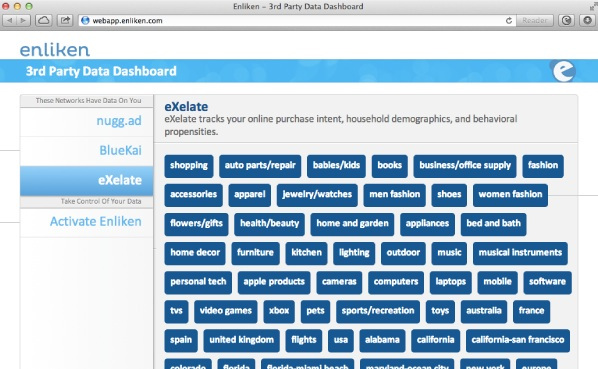Online privacy and how consumer data is tracked online has been a recurring theme on this site. The current Internet economic model is driven by advertising, which is targeted by tracking the online behavior of consumers. In exchange, consumers enjoy free or very low cost services and applications.
I call this the quid-pro-quo of the current Internet economy, and too often it’s an unspoken, poorly understood exchange. I believe companies need to be far more transparent about how this exchange works. Back in 2008 I wrote about the controversy around ISPs tracking customer behavior, and suggested that ISPs should pay consumers for access to such personal information.
It’s been four years, but the day of personal data as currency may have arrived. An article by GigaOm talks about startup companies looking to create a market for the exchange of behavioral data. I really like this approach — not only is transparency the right thing to do, but it can create a promising new market that encourages consumers to take control of their online profiles.
Here’s a description of the model, with author Derrick Harris using the startup Enliken as an example:
The first step in Enliken’s plan is simply to show users what companies such as eXelate and BlueKai are collecting about them as they surf the web. He thinks shedding light on the problem is a better idea than simply trying to block all third-party cookies because enlightenment can help alleviate some of the fear of what’s going on. “While people were aware [data collection] was happening,” Guldimann explained, “they were scared but they were also kind of clueless.”
Once consumers know what kind of data is actually being collected about them, they can make a more-informed decision about how to act. One option might be to go ahead and click the “Do Not Track” button wherever they can. However, another might to realize the overall low quality of the information that advertisers have and smell an opportunity to make everybody’s lives better.
This sort of clear and open quid-pro-quo can also happen without a middleman. Companies like Google and Facebook already have massive amounts of data about users. Google recently began paying users directly who choose share more online information with the company. A company called Placed offers a mobile application that users download to share their offline, brick and mortar activity with advertisers.
That’s more than many of us would want to share. But the key is that this is totally the consumer’s decision, based on their judgement on the value of the exchange.
The Internet has shifted the balance of power to the consumer for many transactions by making information much easier to access. But until now the Internet quid-pro-quo has been poorly understood and conducted in the shadows. If this model catches on, consumers may regain power over their personal information and finally get paid for their role in the Internet ecosystem.
Want to subscribe directly? Here’s how:
